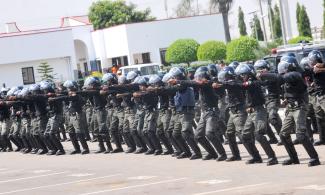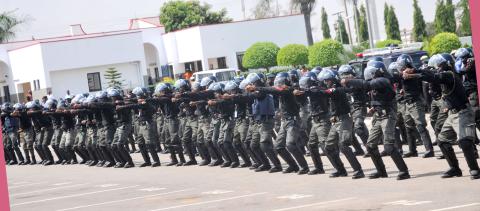
It is advisable that before we plunge into this delicate issue, the country must convince itself that it is not going to arm several factional war-mongering armed groups that will stand diametrically opposite each other and rather worsen the security challenges the idea is aimed at solving.

Recently, then Acting President, Yemi Osinbajo, announced that steps are being taken to decentralize the Nigerian police. This police decentralization scheme has forms part of the canons of the noisome demand for restructuring of the Nigerian polity. The later-day amplifiers of restructuring said that the central police we have at present is both unwieldy to meet the critical needs of policing and too centralized to police the nooks and crannies of the country and deal with rising security issues that gnaw on Nigerians. They may be partially right. The ubiquitous nature of the Nigerian police has rather made it difficult for the police to meet the security needs of Nigerians and has been deficient in securing the lives and properties of Nigerians. Again, the rigid central command of the Nigerian police has sometimes become a burdensome encumbrance on its capacity to permeate the nooks and crannies of the country and deal with security issues which mutate by the day and require such close security marking as community policing can muster to deal with.
However, we should be sure that the decentralization plan is not to wholesomely grant the demand for state police which suffers from many deficits. Some people wrongly interpret the decentralization plan to mean granting state police. This, I believe, is not the intention and how the plan is implemented will prove this at the end of the day.
What really vitiates the demand for state police is the lack of sincerity and honesty in those that have made the demand a sonorous credo in recent times. It does not demand any strenuous inquest to know that those who noisily clamour about state police as an integral part of the complex and hardly-articulated call for restructuring do so basically from an expedient political standpoint. The demand is not borne out of patriot reasons, which introduces the greatest and most potent danger in granting state police; the use of state police for political purposes! It is quite strange that those that noisily clamour for state police today have been strident and implacable foes of that same demand some light years ago. Because of the recent re-arrangement of the country’s political equilibrium, they have turned around to become arch-protagonists of the very same issue they had spent decades fighting against. On the other side, those that developed the template for state police and fought vigorously for it some few years ago are no longer enthusiastic about the clamour. So the issue of where one stands on this issue is a matter of political expediency, interests and position.
The decentralization outline still needs to be given some conceptual clarity for Nigerians to understand the scope and extent it will go. Some questions poring through the minds of Nigerians remain’ will the decentralized police also have decentralized control or still be under the present control regime? Will new men be recruited to drive it or it will operate with the existing men of the Nigerian police? Will the decentralized police operate side-by-side with the present police? Perhaps when the policy gets implemented, Nigerians will know whether the plan will cure the well-reified incompetence and shortfalls of the present Nigerian police and whether it is an answer to the clamour for state police. So until much light is thrown into the police decentralization plan, no one can rightly say if the plan deals with the multifarious problems besetting the present police force. In whatever guise the plan pans out, it is obvious that it is intended to rend the tight central command the police have at present and grant some reasonable autonomy to the component parts of the federation in matters that pertain to control of the police. This is apart from the intendment to deal with the age-old impediments that have made the Nigerian police a noxious, ineffective outfit and has lowered its rating amongst Nigerians.
However, it is advisable that before we plunge into this delicate issue, the country must convince itself that it is not going to arm several factional war-mongering armed groups that will stand diametrically opposite each other and rather worsen the security challenges the idea is aimed at solving. It is one’s honest feeling and belief that as political positioning in Nigeria is a game of musical chairs, the country should not be in a hurry to take decisions that may plunge the country into a fratricidal warfare in the long run. In decentralizing the police, care should be taken to ensure that while the decentralized police units are granted some reasonable levels of autonomy to deal with particular issues that affect their operational areas, a level of central control must be maintained to ensure they don’t grow wings and serve diverse interests that seriously impair the nation’s unity in the long run. Care must be taken to weave through the political schemes that are standing ready to latch onto the plan for narrow political ends if decentralization makes control of the police fluid and manipuable to some vested provincial interests.
Yes, it can be reasonably argued that a decentralized police can draw its manpower from a given localized zone and is best suited to know and deal with localized problems within its area of operation but adequate care should be taken to maintain the control over it so that Nigeria is not reduced to a boiling cauldron of contending police forces that could be used to divide rather than build a united country that draws strength from its diversity. Even as a decentralized police, there should be adequate caution to maintain a unified standard, unified training, unified scope and world view as well as unified control to ensure that abuse does not creep in to endanger the wellbeing of Nigerians. While each decentralized police unit will draw from its own peculiarities within its given area of operation, there must be requisite provisions to safeguard the core of policing which aligns with the corporate interests of the Nigerian nation. We should be careful not to create regional or state armies that hears not its owner’s whistle but carry out in quite contradictory manners that will ultimately endanger the peace and unity of Nigeria.
Also, the issue of funding the decentralized police will be a critical issue because certainly, he who pays the piper dictates the tune. This is also one of the impediments that will work against state police at any given day because the states, as composed in Nigeria presently, are precarious, dependent units that are struggling to meet their basic demands to the people. I wonder what kind of police a state that is owing several months of workers’ salary can run. Policing is a core security issue that requires funding from the first line charge but what can a state that goes cap-in-hand to the center for sustenance do when it is not assured of an independent funding scheme? A hungry, disheveled and ill-equipped police becomes an instant danger to those it is meant to police so states have to be solvent before they can meet the demands of state police. In the decentralization plan, such issues as funding determines where the control and loyalty of the police lie. So decentralizing the police will have meaning when its funding arrangements are sorted out and there are no two ways to fund the police in Nigeria today than from the federal level given the tentative financial status of the states.
But in all, it is my honest opinion that what the police needs most today is complete evaluation of its personnel, methods, arms and total re-orientation. This must be holistic and radical to ensure that both a new template and new personnel are developed to take the police from staid, rotten and odious stereotypes and strategies. The Nigerian police needs complete overhauling to meet the policing demands of a complex and modern society, new values, new ethos, new ground rules, new strategies, new orientation, new equipment and new hands are needed in the Nigerian police to redirect it from its present invalid state to a functional state. I honestly don’t feel state police answers our problems here as I fear that the demerits of a state police trump its merits. Maybe decentralized police will be the panacea to our policing problems. Maybe, just maybe.
Peter Claver Oparah sent this from Ikeja, Lagos, via [email protected]